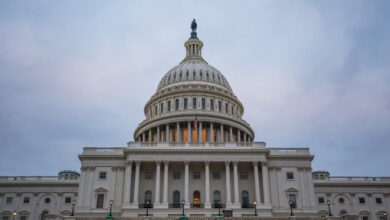Fact checking Trump's claims about 'election integrity'

(WASHINGTON) — Former President Donald Trump and Speaker Mike Johnson have a joint appearance at Mar-a-Lago Friday afternoon where they are discussing “election integrity.”
The topic is a chief priority for Trump, the presumptive GOP nominee, who continues to falsely claim that he won the 2020 election. Trump’s calls for “election integrity” come in an election year when there is expected to be another tight matchup against President Joe Biden.
Johnson has echoed Trump’s calls for “election integrity” and was one of the 147 GOP lawmakers who voted to overturn the results of the 2020 election. He also led the charge to get 125 of his Republican colleagues to sign an amicus brief to the Supreme Court, supporting Texas’ lawsuit that would have invalidated the election results in key battleground states.
ABC News is fact checking some of Trump’s previous and false comments on elections and voting ahead of the joint appearance with Johnson.
State and federal courts have dismissed more than 50 lawsuits across six states from Trump and his allies aiming to overturn the results of the 2020 election. In many of the cases, Trump pushed thinly supported allegations of election misconduct and fraud.
Trump has continued to falsely claim he won the 2020 election in Pennsylvania, Wisconsin and Michigan, but he lost all three of those states in the last presidential election. In Pennsylvania, Biden won by 81,660; in Michigan, Biden won by about 21,000 votes; in Wisconsin, Biden won by more than 20,000.
The United States National Intelligence Council, comprised of the United States’ intelligence and security agencies, announced in 2021 that it found “no indications that any foreign actor attempted to alter any technical aspect of the voting process in the 2020 elections.”
Trump has also criticized voting methods.
Trump routinely disparages mail-in voting and has made unfounded claims about the process which he claims, in part, led to his 2020 election loss. Despite his repeated claims about mail-in vote fraud, no widespread fraud has been found. A Washington Post analysis of data collected by three vote-by-mail states with help from the nonprofit Electronic Registration Information Center found that there were 372 possible cases of double voting or voting on behalf of deceased people out of about 14.6 million votes cast by mail in the 2016 and 2018 general elections. That comes out to 0.0025%.
“Mail-in voting is totally corrupt. Get that through your head. It has to be,” Trump said at a rally in Michigan in February, repeating unfounded claims about mail-in voting.
Trump has also continued to float claims against voting machines, pushing for paper ballots instead.
“I will secure our elections. We are going to secure our elections. Our goal will be one-day voting with paper ballots — very simple — and a voter ID, but until then, Republicans must win. Landslide. We want it to be too big, too big to rig,” Trump said at an April 2 rally in Wisconsin, where he continued to falsely claim he won the state in 2020.
However, the vast majority of Americans already vote with hand-marked paper ballots or on touch-screen machines that print one.
Trump and his allies have claimed that Democrats are “importing voters” to allow non-U.S. citizens participate in the U.S. elections.
“That’s why they are allowing these people to come in — people that don’t speak our language — they are signing them up to vote,” Trump said at a January rally in Iowa.
While election officials and law enforcement authorities have found cases of non-citizens voting or attempting to vote over the years — either by mistake or with malicious intent — it has not been enough to affect the any outcome of an election, the Washington Post reported.
PolitiFact reported that it has found no effort by Democrats to register people in the country illegally.
“Most noncitizens don’t want to risk jail time (or deportation if they are here illegally) by casting a ballot. Election officials take several steps to ensure that only eligible voters cast ballots,” PolitiFact reported.
In Georgia, for example, the attorney general’s office announced in 2022 that the state had found a total of 1,634 cases of potential noncitizens registering to vote in the state since 1997 — none of whom were permitted to vote.
Copyright © 2024, ABC Audio. All rights reserved.






